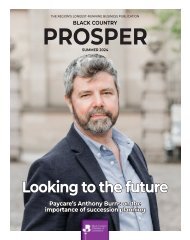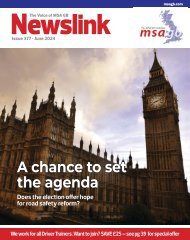Prosper Spring
Black Country Chamber membership magazine. Business news, advice, events, training.
Black Country Chamber membership magazine. Business news, advice, events, training.
- No tags were found...
Create successful ePaper yourself
Turn your PDF publications into a flip-book with our unique Google optimized e-Paper software.
NEWS<br />
Encouraging male staff to seek support must<br />
continue, Paycare boss urges<br />
Businesses are being encouraged to offer<br />
wellbeing support to male workers following<br />
a rise in the numbers seeking counselling.<br />
Research has historically shown men are<br />
less likely to reach out for support with<br />
physical or emotional health complaints, but<br />
a recent report from the British Association<br />
for Counselling and Psychotherapy shows<br />
27% of men are now doing just that, seeking<br />
counselling, up from 18% previously. This<br />
means 45% of all those accessing counselling<br />
provided via their workplace are men.<br />
Anthony Burns, CEO at Health Cash Plan<br />
provider Paycare, (pictured) says while the<br />
news is positive, organisations should<br />
continue to promote availability of and<br />
access to a variety of wellbeing assistance.<br />
“We know historically men have been<br />
more reluctant to seek support than women.<br />
For example, a BMJ study found the<br />
number of GP consultations attended by<br />
men was 32% lower than the number<br />
attended by women, and this wasn’t<br />
because women were seen an ‘excess’<br />
number of times.<br />
“Just as we’ve collectively worked to<br />
reduce stigma in the community around<br />
mental wellness, we also need to continue<br />
working to promote the benefits of<br />
accessing support for both physical and<br />
emotional issues.<br />
“We know that, sadly, when people put<br />
off seeking a solution to a problem, the<br />
problem can worsen. And that’s why early<br />
help, and proactive as well as reactive<br />
healthcare, is beneficial for us all.<br />
“At Paycare, we’ll certainly be continuing<br />
to encourage the companies we<br />
work with to promote use of<br />
telephone counselling (also<br />
known as Employee<br />
Assistance Programmes),<br />
access to virtual GP<br />
appointments, and other<br />
services which men should<br />
use if needed. The earlier the<br />
better!<br />
“It’s also crucial to remember<br />
that this isn’t just about supporting<br />
those who have existing or emerging<br />
mental health conditions, or who are<br />
experiencing a specific issue which has<br />
caused a dip in their wellbeing. All of us<br />
have ‘mental wellness’ on a scale which can<br />
vary from day to day, and even within a day<br />
itself.<br />
“So while providing effective and timely<br />
support for those among your staff who<br />
have mental ill health is absolutely crucial,<br />
it’s also about ensuring everyone is as far<br />
towards that ‘well’ end of the scale as they<br />
can be each day.<br />
“Cultivating a workplace environment<br />
and culture which supports wellness, having<br />
checks and procedures in place which<br />
ensure it’s picked up on when someone is<br />
further down the scale than usual, and<br />
being proactive rather than simply reactive<br />
in our care and attention, all helps hugely<br />
when it comes to wellness.<br />
“Alongside that, let’s make talking about<br />
where we are on that scale a normal part of<br />
office conversation. Whether you assign a<br />
number from 1 to 10, or physically mark off<br />
on a line where your mood is, that<br />
can make identifying who<br />
might need support and what<br />
form that might take much<br />
easier.<br />
“Accessing workplace<br />
counselling for wellness, not<br />
just for illness, needs to be<br />
normalised, too. Men may<br />
feel there needs to be a<br />
specific problem or they need to<br />
have a recognisable condition for<br />
them to seek support. But this is absolutely<br />
not the case.<br />
“Support is there for anyone regardless<br />
of whether there’s something long-term<br />
going on, or whether they’re just having a<br />
bad day and need to tell someone about it.<br />
Given the ongoing cost-of-living crisis and<br />
the issues we’ve all experienced over the<br />
last few years, it’s not surprising that more<br />
people are reaching out for that support.<br />
“We see that as a positive. Proactive<br />
workplaces put support in place because<br />
they want employees to use it - so let’s keep<br />
encouraging men in particular (but also<br />
anyone within our workplaces) to keep<br />
themselves mentally well and to see<br />
workplace counselling as a fantastic way to<br />
do exactly that.”<br />
Visit www.paycare.org/wellbeingservices/eap-helpline<br />
for more<br />
information about the Health Cash Plan<br />
Provider’s Employee Assistance<br />
Programme.<br />
Cost-of-living crisis driving depression<br />
surge among business owners<br />
Following a tumultuous two years of lockdowns, restrictions and<br />
uncertainty, new research has revealed that the challenges facing<br />
owners today are proving no less difficult to navigate for small<br />
business owners. In the midst of the cost-of-living crisis, many<br />
describe how their mental health has worsened, with a fifth<br />
(20%) reporting battling depression.<br />
The survey of over 600 small business owners, commissioned<br />
by small business insurance provider Simply Business, has<br />
revealed the key challenges facing SME owners in 2023. With a<br />
fifth (22%) rating their mental health as (18%) ‘bad’ or (4%) ‘very<br />
bad’. Over half (51%) reported feeling stressed, two-fifths (39%)<br />
have been experiencing anxiety, while over one-in-five (22%)<br />
struggled with insomnia.<br />
Over four-in-five (81%) small business owners are worried how<br />
the cost of living crisis is affecting their business, with two-thirds<br />
(65%) seeing rising costs as the biggest challenge to it.<br />
The key results were:<br />
• 20% of small business owners are struggling with depression<br />
• 39% have struggled with anxiety and 22% with insomnia<br />
• 22% would rate their mental health as bad<br />
• 81% small business owners are worried about how the<br />
cost-of-living crisis will impact their business in 2023.<br />
16 PROSPER SPRING 2023

















